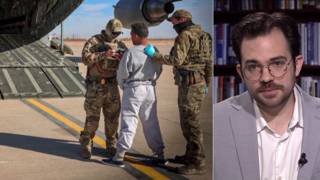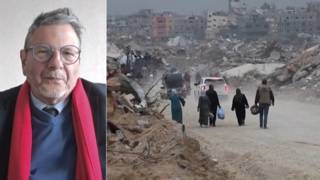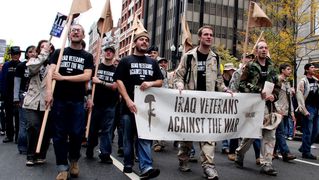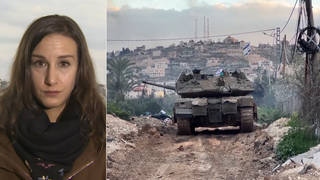
Related
Topics
Democracy Now! speaks with Geoffrey Millard, chapter president of the IVAW in Washington, D.C.; David Bellavia, vice chair of Vets for Freedom; and Steve Russell, founder and chair of the group Vets for Victory. [includes rush transcript]
Transcript
AMY GOODMAN:
Monday’s march here in St. Paul was Iraq Veterans Against the War’s second major convention rally in less than a week. Last week, the Democratic National Convention in Denver, IVAW members led a crowd of some 10,000 people to call on Barack Obama to endorse ending the Iraq war and paying reparations to the Iraqi people. Iraq Vets Against the War have emerged as a leading force in the antiwar movement in this country.
I’m joined now by one member of that group and another veteran at the opposite end of the political spectrum when it comes to the Iraq war. From Iraq Veterans Against the War, Geoffrey Millard served thirteen months in Iraq, now chapter president of the IVAW in Washington, D.C.
My other two guests have come to St. Paul to support John McCain at the Republican National Convention. David Bellavia is vice president or vice chair of Vets for Freedom. He was awarded a Silver Star for his service in the second US attack on Fallujah in November 2004. He is co-author of the book House to House: An Epic Memoir of War. We’re also joined by Steve Russell. He’s founder and chair of the group Vets for Victory. He also sits on the board of Vets for Freedom and has served more than seven years overseas, including stints in Kosovo, Kuwait, Afghanistan and Iraq.
You are a retired — what rank?
STEVE RUSSELL:
Lieutenant colonel.
AMY GOODMAN:
Lieutenant Colonel, your thoughts during this Republican convention?
STEVE RUSSELL:
Well, I think, from the perspective of veterans, one, we want to see the mission through. We’re more secure as a nation when we have success in Iraq rather than failure. I think that’s something that is on many of the veterans’ minds in the groups that we represent. Veterans benefits, of course, are important. I think that would be true regardless of political makeup.
AMY GOODMAN:
David Bellavia?
DAVID BELLAVIA:
We haven’t really seen much of the convention, because there really hasn’t been much going on, you know. But one of the things that I just want to clarify real quick, we’re a nonpartisan organization, so we’re not really here to support a political candidate. We actually have endorsed Democrats. We were there at the convention last week. But for the most part, we’re kind of waiting for the convention to get going and see if we actually hear about the things that — you know, we always tend to look at how we disagree and how far apart we are on the issues with the war, but there’s a lot that we do agree on. And one of those things are veterans’ rights and veterans’ benefits.
And one of the things that we saw in Denver was not a whole lot of attention toward solutions. It’s important to identify the problems, but not a lot of attention was brought to those solutions, and I’m curious to see what the Republicans have to say here in Minnesota.
AMY GOODMAN:
Geoff Millard, talk about what is going on in Iraq Vets Against the War and your feelings about these wars.
GEOFFREY MILLARD:
Well, we came to Minnesota and St. Paul to really highlight the fact that Senator McCain has an atrocious record on voting for veterans’ issues. If you look at Iraq and Afghanistan Veterans of America, just released a report that rates him at a D. Disabled Veterans of America rate him a D-. And the only veterans groups really that have officially backed him are ones that do not keep record of congressional votes, those being the Veterans of Foreign Wars and —- sorry, slips my mind, the other veterans’ group, but the fact of the matter is -—
AMY GOODMAN:
The American Legion?
GEOFFREY MILLARD:
The American Legion, you’re right, thank you. But those veterans’ groups don’t keep statistics on congressional voting record. And while I honor Senator McCain’s service and the fact that I’m glad that we have veterans that are serving in the US Senate, the fact of the matter is, is just because you are a veteran does not mean that you vote well on veterans’ issues. And if we take a look at his voting record on veterans’ issues, if that’s what a McCain presidency is going to look like, I’m terrified for the future of veterans in this country.
AMY GOODMAN:
What do you think of the protests in the streets, and especially this issue that Geoff is raising of veterans’ care here?
STEVE RUSSELL:
Well, I think when you look at someone who is likely to understand the burden of families rather than someone that has a family or someone that doesn’t, with regard to Senator McCain or with regard to Senator Webb, say, for example, on the various benefits that have been proposed, we appreciate the fact that a veteran that has seen service and has seen combat service is exploring the issue, instead of someone that has no service. And I think it is an important factor when you have service of that type, when you’ve put yourself on the line and you’ve suffered injury, that veterans are at least going to get a fair hearing. And I think that that will be true of any veteran in our legislature that has served or whether or not it’s a president or vice president.
This is the first ticket that we’ve seen, where on one side of the issue there is no veteran in either the presidential or the vice-presidential candidate. You have to go back decades and decades to find a Democratic or Republican ticket where no veteran was on the ticket. So it’s very unusual, and we’re watching it very closely.
GEOFFREY MILLARD:
I think to call Bush’s service in the military “veteran status” is kind of a joke, don’t you?
STEVE RUSSELL:
He is a qualified pilot. I wouldn’t discredit anyone’s National Guard service. I think to discredit our guardsmen, our men and women that are serving in uniform, I think that would be uncharitable, and I don’t think that’s fair to those that are serving with Gustav right now.
GEOFFREY MILLARD:
I don’t think it’s fair to those who are serving right now to call President Bush a veteran. I don’t think he himself would refer to himself as a veteran. Come on, let’s get serious.
DAVID BELLAVIA:
I don’t want to play that game, though, because I can look at your service, I can look at your peers’ service, and say, you know what, you didn’t have sustained contact, you weren’t in this part of Iraq, you didn’t see that, and you’re not real. I think that’s garbage. You woke up every morning at 5:00. You had a bad haircut. You know what it’s like to sit in a rucksack for eighteen hours and get rained on. You’ve sacrificed. You chose to do that.
GEOFFREY MILLARD:
Unlike President Bush.
DAVID BELLAVIA:
Well, I disagree. I think any man that’s served his country, whether it’s Al Gore or it’s Joe Biden’s son as a JAG officer or it’s Governor Palin’s son that’s going go to Iraq on September 11th, I think that service is important. I’m not going to tell a Cold War vet, you didn’t serve your country for twenty years, because you never got shot at.
AMY GOODMAN:
I think the issue for George W. Bush is whether he — not to discredit the National Guard in any way — whether he showed up.
GEOFFREY MILLARD:
Whether he actually did that.
DAVID BELLAVIA:
You know, again —
GEOFFREY MILLARD:
Since I served in the National Guard.
DAVID BELLAVIA:
Well, no.
GEOFFREY MILLARD:
I’m not discrediting National Guardsmen.
DAVID BELLAVIA:
Well, first of all, he was in the Air National Guard, so that’s completely different, you know. But again, not to defend, you know, a president’s service or, you know, President Clinton, who didn’t serve at all, neither here nor there. What it comes down to is our organization. Alright, what’s beautiful about the veterans’ movement is that we can all kind of break off. We all do our different things. We’re all passionate about what we believe in. But we all have our little subject matter expertise.
And what Vets for Freedom is all about is the undeniable progress of what’s happening on the ground resulting from the surge in Iraq. I got to witness it firsthand thirteen days ago. We both served in a war. We both, you know, had different experiences. We both left maybe disenfranchised. I know I was upset when I left, as far as where we were at when I left. But now on the ground, one of the things that we can both agree on is that Iraq is a better place today, and that sacrifice —- you want to talk about reparations -—
AMY GOODMAN:
Better than…?
DAVID BELLAVIA:
Than when I was there. I mean, it was, I mean, cats and dogs. I mean, we’re talking about, you know, areas of Diyala province and Anbar province that you had to sprint to get to corner to corner, because you couldn’t walk, you know. And today, you’re starting to see the Iraqi people actually embrace. You know, you mentioned reparations to the Iraqi people. I mean, I think 4,000 American, you know, beautiful, brave souls is far more than any foreign land should get in reparations. We’ve paid our debt to those people. And it’s important that, you know, we continue to stand by them as they fight those that are occupying them today, which is al-Qaeda and foreign jihadists.
GEOFFREY MILLARD:
Yeah, we actually do agree on something. 4,000 is way too many to be sacrificed in an illegal war. Let’s face it, regardless of what the violence level is down to, the fact is, is that the surge did bring violence level down —
DAVID BELLAVIA:
Absolutely.
GEOFFREY MILLARD:
— to an unacceptable level. It was unacceptable before the surge. It’s unacceptable now. The fact of the matter is, is the invasion and continued occupation of Iraq was illegal in 2003, just as it’s illegal in 2008, as it will be in 2009 and 2010.
STEVE RUSSELL:
Actually, the legality for the war was well established.
AMY GOODMAN:
Lieutenant Colonel Steve Russell.
STEVE RUSSELL:
The Iraqi Liberation Act was signed as national policy based upon numerous violations of the first Gulf War, which Saddam did not adhere to. When you have a loser in a war, they bow to the conditions of the winner. In this case, he violated both United Nations and US agreements and coalition agreements.
GEOFFREY MILLARD:
That would be those weapons of mass destruction that were found?
STEVE RUSSELL:
No, it would be —-
DAVID BELLAVIA: No, actually, it’d be a kilometer -— anything — a rocket that goes over two kilometers.
STEVE RUSSELL:
— a number of things. We have about eighteen of them, if you would care to look at it. In 1998, this was signed into national policy that would effect a regime change. It was good policy in 1998, when President Clinton signed it, and it was the legal basis for the beginning of the war in 2003, when the new president and a new administration used it to effect that policy. So to say that it was illegal is certainly not the case, because the Congress would have certainly looked at the legalities of those issues. And it was our national policy as signed into law in 1998.
AMY GOODMAN:
Well, Staff Sergeant David Bellavia, what about that issue of weapons of mass destruction? The Democrats who joined with Republicans, like Clinton and Edwards and Kerry, they all say they feel deceived now, that they were being given information about weapons of mass destruction that now turns out not to be true.
DAVID BELLAVIA:
Yeah, well, you know, that dog doesn’t hunt, because as a senator you have access to the information that we didn’t have access to. First of all, we didn’t get a vote when we went to Iraq. No one asked me, “Do you think there’s weapons of mass destruction?” Quite frankly, I wasn’t a big fan of deploying away from my family. I was gone for three years. You know, I’d rather be home with my kids and my wife.
But the truth of the matter was that these senators voted for the war, and these senators had access to the intelligence that you and I can’t have access to. So I kind of am up in the air, and I see one side of the aisle that’s being constantly being berated for bringing us to war in Iraq and the other side — when I was at the Democratic Convention, 80 percent of those people voted for the war. And, by the way, those 80 percent that — when we hear Senator Obama, who’s really the only one that’s in this race that wasn’t even elected at the time, he didn’t have access to that intelligence.
So, you know, for all these individuals to step up and say, “Well, you know what, we voted for a war,” I have no control over what my nation sends me to do. But I know that I joined voluntarily to be an infantryman, and I joined to avenge. I joined to protect the very liberties that we’re seeing on display right now. And I don’t have a time machine to go back to 2003, but I live in real-time. In a real time, there’s still enemies in Iraq. Were they there in ’03? I don’t know. But that’s my job.
AMY GOODMAN:
You said you joined to avenge. Avenge what?
DAVID BELLAVIA:
Absolutely. As an infantry soldier, I am a warrior. OK? My job —
AMY GOODMAN:
What were you avenging?
DAVID BELLAVIA:
I was avenging those that want to destroy our culture and our way of life.
AMY GOODMAN:
Meaning 9/11?
DAVID BELLAVIA:
No, meaning that Islamic — you know, Anbar province was long regarded as a Sunni extremist haven. In the second battle of Fallujah, my unit came across individuals with passports from Chechnya, from Bosnia, from Italy, from the Philippines, from Hezbollah — Hezbollah guerillas wearing Iranian Revolutionary Guard passport paperwork. These are Shias that we took paperwork off of in a Sunni enclave of Fallujah. Now, we saw this with our own eyes. Whether or not they were there in ’03 — when I was on the ground and my soldiers were getting killed, we were being killed by a global Islamist all-star team. And where they show their heads, you know, we’re going to take them out. That’s our job.
AMY GOODMAN:
Sergeant Geoff Millard?
GEOFFREY MILLARD:
Well, I mean, I just think it’s funny that we can just eliminate and not worry about the reasons why we went to war. I mean, I would give credit to the fact that the US military has helped. It isn’t the only thing that’s brought violence levels down. Let’s face it, the Iraqis have done a lot in that manner. But yes, the increase in US troops has helped to a degree in bringing that down. But the fact of the matter is, it’s still at an unacceptable level. That’s where we are today, at an unacceptable level in a war that we never should have been in. We are occupying a foreign country.
DAVID BELLAVIA:
What can you do about that now?
GEOFFREY MILLARD:
You take the troops out, you take care of them when they get home, and you pay reparations to the Iraqis, just as —
DAVID BELLAVIA:
Why do I need to pay reparations to the Iraqis? I didn’t do anything.
GEOFFREY MILLARD:
Just as — just as Iraq, to this day, is forced to pay reparations to Kuwait for that illegal invasion. The fact of the matter is, is that reparations are due under international law and under common morality. The fact of the matter is we’ve killed more than 1.2 million Iraqis, OK?
DAVID BELLAVIA:
That’s absolutely unfounded.
GEOFFREY MILLARD:
1.2 million Iraqis.
STEVE RUSSELL:
That doesn’t sync with the Iraqi government statistics at all.
DAVID BELLAVIA:
I mean, that’s a ridiculous number.
GEOFFREY MILLARD:
It’s not at all.
STEVE RUSSELL:
But I’ll take on the weapons of mass destruction issue.
AMY GOODMAN:
Lieutenant Colonel Steve Russell.
STEVE RUSSELL:
Yeah, if you look at the testimony of Dr. Ahmed Obeidi, who was Saddam’s nuclear physicist, he had a Zippe centrifuge in hand. This was a Western-manufactured centrifuge. Centrifuge, it refines uranium, in simple terms. Only a handful of nations have acquired this Western-made technology. Let me name a few of them: Israel, Pakistan, North Korea. You look at these nations, they have one thing in common: they all developed the bomb. They had this technology in hand. Now, what they didn’t have was the complete oversight or lack of oversight to develop their nuclear weapons program. We found yellowcake. We have a Zippe centrifuge there. No other nation left to themselves was not able to develop the bomb with the Zippe centrifuge in hand.
AMY GOODMAN:
Ten seconds, Geoff Millard.
GEOFFREY MILLARD:
Well, I think what we’re talking about then is preemptive war, is going into war with the possibility that someday a nation may be a threat. That, in and of itself, as a policy, is a threat to national security.
AMY GOODMAN:
I want to thank you all for being with us.
STEVE RUSSELL:
Nuclear proliferation has always been our national policy, to contain it.
AMY GOODMAN:
Staff Sergeant Geoff Millard, thank you for being with us, Iraq Veterans Against the War. I want to thank Lieutenant Colonel Steve Russell for joining us, veteran of Afghanistan and Iraq, and Staff Sergeant David Bellavia. Thanks so much for being there. We’ll link to all of your websites.












Media Options